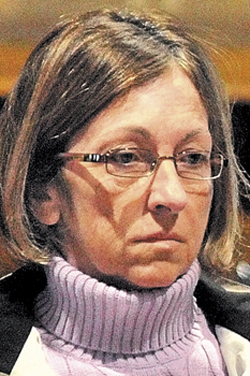BANGOR — Former Chelsea Selectwoman Carole Swan’s most recent federal court filings portray her as a battered wife, doing her husband’s bidding under severe duress.
That claim by her lawyer, Leonard Sharon, threatens to derail the start of Monday’s anticipated three-week trial of Swan and her husband, Marshall Swan, on multiple fraud charges.
Documents filed this week in U.S. District Court in Bangor show Carole Swan will blame her husband for much of the trouble.
Sharon claims his client was a victim of Marshall Swan’s verbal, mental and physical abuse. Sharon’s trial brief insists Carole Swan “was not the calculating brains behind (Marshall Swan Construction).
Rather, with limited ability and comprehension, she did the tasks he demanded of her exactly as she was told, or at least tried to. Her intent was never to defraud the government. Her intent was not to hide income earned from (Marshall Swan Construction). Her intent was to survive. She did the best she could. If she made mistakes, they were the result of the chaos and ongoing abuse that ruled her life under Marshall.”
In a document filed this week with the court, Sharon said Swan “suffered black eyes, bruised ribs, and clumps of hair being pulled from her head as she was dragged from room to room.” Sharon describes Marshall Swan as “a horrible abuser of his wife. His behavior was and is chilling.”
Because of Sharon’s attempt to blame Marshall, his attorney, Walter McKee, renewed an attempt to have the trials separated or delayed. This defense of Carole Swan, 55, to multiple fraud charges, means the couple cannot be tried together, McKee said.
“Carole Swan’s trial should go forward on Monday,” McKee told Judge John A. Woodcock Jr. in a written motion. “Marshall’s trial should not.” McKee categorizes the new claim as “unquestionably explosive.”
The prosecutor, Assistant U.S. Attorney Donald Clark, wants the trial to begin Monday and the defendants to be tried together.
“It would appear (that Carole) Swan is proposing to present a defense of duress based entirely on inadmissible evidence,” Clark said.
Woodcock is expected to make a ruling on McKee’s request to separate the trials on Friday.
On Wednesday, McKee asked the court to sever the cases “lest Marshall be faced with having to defend against felony violence allegations in the course of this federal tax, workers’ comp and program fraud cases, allegations that would not be admissible in a separate trial against Marshall.”
An earlier attempt by McKee to sever the cases was rejected.
“Here, Carole and Marshall have unquestionably mutually antagonistic defenses that will put the co-defendants in essentially adversarial roles against each other,” McKee said, in his effort to get the cases severed and win a delay for Marshall Swan. “For Marshall to defend against these new allegations … would require at least a month, perhaps longer. …”
Clark, the federal prosecutor, objects to any delay and severing. He said he stands ready to call 120 witnesses and introduce hundreds of exhibits.
“The defense has not produced any protection from abuse records or any other records suggesting that Swan was the victim of domestic violence sufficient to raise a defense of battered woman’s syndrome and the government is unaware of any such evidence,” Clark wrote.
In fact, documents in Augusta District Court and Kennebec County Superior Court show that Marshall Swan, 56, was once charged with a Feb. 3, 2006, assault against Carole Swan in Chelsea.
No details were available in the court’s file, but conditions of bail prohibited Marshall Swan from contact with Carole, their younger son and the family home.
Marshall Swan pleaded guilty to assault on Feb. 14, 2006, in Kennebec County Superior Court, but the plea was withdrawn and the charge dismissed after Marshall Swan successfully completed a 12-month deferred disposition that included counseling.
In the federal case, the Swans are accused of falsifying income tax returns for Marshall Swan Construction, owned by both Swans, and failing to declare a total of almost $674,000 over tax years 2006 to 2010, as well as defrauding the Federal Emergency Management Agency about a culvert project in town.
Carole Swan also faces charges she defrauded the federal workers’ compensation program by collecting almost $205,000 in wage loss benefits, claiming she was totally incapacitated by a right shoulder injury suffered in the 1990s while working for the U.S. Postal Service.
The government maintains she lied by concealing her ownership interest and participation in the construction company as well as a harness racing business and underreported her work— and income — as a Chelsea selectwoman and assessor.
“I cannot work I do not work I can not even clean my own house or blow dry my hair,” Swan wrote on federal claim forms in 2010 and 2011.
At a pre-trial hearing, Carole Swan testified that, with the exception of names and numbers, she could neither read nor write. Sharon has said that claim will factor into her defense at trial.
In ruling against suppressing statements Carole Swan made in a Feb. 3, 2011, interview at the Kennebec County Sheriff’s Office, Magistrate Justice Margaret Kravchuk wrote, “I found her testimony about most events highly strategic in nature and less than reliable.”
The indictment also says Swan failed to report as income $20,000 she extorted and attempted to extort from Frank Monroe Construction. A judge ruled that Carole Swan will be tried separately later on an extortion charge.
The two Swans also are accused of committing fraud in the Windsor Road Bridge Culvert project, which was funded by the Federal Emergency Management Agency. The work to replace the culvert was awarded to Marshall Swan Construction, and prosecutors say the culvert price was misrepresented.
In response to the government allegations, Leonard Sharon, in his trial brief, says the government must prove Carole Swan intentionally made statements on the income tax returns and on the federal worker’s compensation forms while knowing they were false. Sharon also says the government must prove Carole Swan intentionally misrepresented the cost of the Windsor Road project.
“None of this will stand up at trial,” Sharon wrote.
For instance, he says Carole Swan was the “nominal owner” of harness horses because her brother in Ohio had such bad credit he could not have horses in his name.
Sharon’s defense of Swan talks about her as the center of political rifts and gossip in the rural town of 2,800.
“There were cries of foul play and accusations of chicanery in the awarding of contracts to (Marshall Swan Construction),” Sharon wrote. “Yet the public kept electing Carole and the town kept hiring Marshall among others to care for the structured upkeep of the town.”
In his trial brief, McKee gives little information about Marshall Swan’s defense. McKee says Marshall Swan is not ready to say whether he will testify at trial and “reserves his rights under the Fifth Amendment not to set forth in detail his defenses in this trial brief.”
Betty Adams — 621-5631
badams@centralmaine.com
Send questions/comments to the editors.




